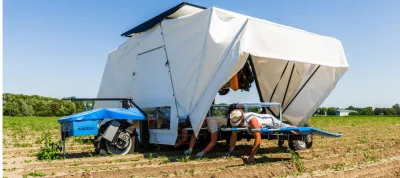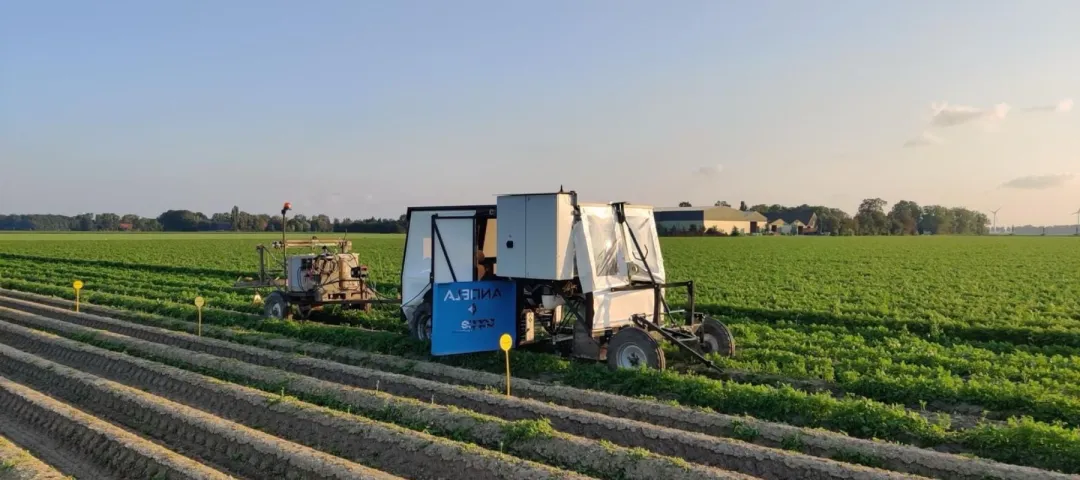General information
RDP Priority
- P2. Competitiveness
RDP Focus Area
- 2A: Farm’s performance, restructuring & modernisation
RDP Measure
- M06: Farm & business development
Beneficiary type
- Small-Micro Enterprise
Summary
Weed control on farms protects food security in Europe, and digitalised robotic weeding tools offer transformative solutions for farmers who supply the increasing consumer demand for organic products. Integrating robotic technology into agricultural practices addresses inefficiencies and high costs associated with traditional weeding methods. By minimising labour-intensive tasks, these technologies enable farmers to focus on other critical aspects of their operations. Robotic weeding not only streamlines farm management but also ensures that organic farming remains economically viable in a competitive market.
A partnership between Dutch specialist firms and organic farms used this project’s CAP funds to help create a new large-scale automated weeding robot. This involved developing and testing a weed detection model, robot arm with control software, and self-propelled solar-powered vehicle. The project's innovation frees up human labour with automation. It uses cameras, AI, and robotic units to provide a cost-effective and 24/7 solution. This robot helps move towards herbicide-free agriculture and improves water quality.
Results
The project successfully automated weed detection and removal through advanced robotic technology. By integrating AI for real-time decision-making and employing precise imaging systems, it replaces manual labour with efficient, 24/7 operations. Specific project achievements span multiple dimensions, including:
- cost savings of approximately 50% for farmers due to reduced labour costs and operational efficiencies with the robot's 24/7 capability.
- improved productivity and profitability for organic farmers by enhancing crop health through precise weed detection and removal.
- winning an Agribusiness Award in 2022 amplified visibility and credibility among stakeholders.
Demand for this technology resulted in five initial orders for the final fully-tested robotic weeder.

Promoter
Andela Techniek & Innovatie B.V.
Funding
Total budget 356 994 (EUR)
EAFRD: 124 948 (EUR)
National/Regional: 124 948 (EUR)
Private/own: 107 098 (EUR)
Keywords
Ressources
Documents
Context
Weed control on farms protects food security in Europe, and digitalised robotic weeding tools offer transformative solutions for farmers who supply the increasing consumer demand for organic products. Integrating robotic technology into agricultural practices addresses inefficiencies and high costs associated with traditional weeding methods.
The adoption of robotic systems can greatly reduce the need for all forms of herbicides, aligning with the core principles of organic farming. By minimising labour-intensive tasks, these technologies enable farmers to focus on other critical aspects of their operations. Robotic weeding not only streamlines farm management but also helps ensure that organic farming can remain economically viable in a competitive market.
Autonomous laser-based systems offer precise treatment options that improve weed control accuracy while minimising the risk of negative environmental impacts. Challenges such as high initial investment and performance uncertainty can be addressed by good practice examples that encourage wider adoption among farmers. Increased information on such precision agriculture helps to realise the full potential of robotic weeding for enhancing organic farming practices across Europe.
The Dutch companies Andela Techniek and Innovatie BV have developed extensive experience in creating innovative, high-tech agricultural machines. CAP-funded project helped the firms to launch a new large scale weeding robot that is carbon neutral, data-driven, and AI controlled.
Objectives
This CAP funding was used to address the following challenges:
- certified organic arable farmers are limited in the use of artificial herbicides.
- manual weeding has high costs, misses weeds, limits worker availability, and doesn’t operate 24/7.
- conventional arable farmers must seek alternatives due to the decreasing availability of herbicides and public pressure for reduced herbicide use.
The project’s technical innovations aimed to:
- contribute significantly to a herbicide-free agriculture.
- improve water quality by using fewer herbicides.
- introduce a cost-effective, 24/7 robot that automates weeding, addressing the scarcity of hand weeders and decreasing availability of herbicides.
- provide an effective solution for farmers in relation to increasing pressure on migrant labour, such as unaffordable local rural housing costs.
Activities
This project used CAP support to develop, test, and validate a prototype robot that can automatically recognise and destroy weeds in a farm environment. The project was divided into several activities, including the weed detection model, weed destruction technology, robot arm with control software, self-propelled solar-powered vehicle, and the test phase.
Testing occurred in the fields of the Poppe Landbouw farm, where multiple test fields were sown during the weeding seasons. Poppe Landbouw provided feedback and validated the results. The prototype was also demonstrated to several other organic farmers to gather a broad range of requirements for weeding organic crops. A highly experienced weed specialist assisted in the annotation of early-stage weed recognition. Organic arable farmers, particularly those with larger land holdings, including Poppe Landbouw, assessed the prototype's performance and provided feedback. This feedback was crucial in refining the robot's functionality.
All data needed to train the algorithm was collected, and a weed detection model was developed using images of crops such as onions, carrots, and chicory, along with various weeds.
Main results
The project successfully automated weed detection and removal through advanced robotic technology. By integrating AI for real-time decision-making and employing precise imaging systems, it replaces manual labour with efficient, 24/7 operations. This approach not only reduces labour costs and dependency on herbicides but also enhances crop management accuracy.
Additionally, its collaborative model involving farmers, specialists, and technology developers ensures continuous refinement and adaptation, making it a pioneering solution in sustainable agriculture. The project sets a precedent for future advancements in precision farming technologies, driving forward the evolution of agricultural practices worldwide. It demonstrated the feasibility and effectiveness of integrating AI and imaging technologies in agriculture.
Specific project achievements span multiple dimensions, including:
- cost savings of approximately 50% for farmers due to reduced labour costs and operational efficiencies with the robot's 24/7 capabilities.
- improved productivity and profitability for organic farmers by enhancing crop health through precise weed detection and removal.
- winning the Agribusiness Award 2022 amplified visibility and credibility among stakeholders, expanding Andela Techniek & Innovatie's network among European organic farmers. This recognition validates the project's innovative approach and fosters future collaborations.
Demand for this technology resulted in five initial orders for the final fully-tested robotic weeder.
Key lessons
- The algorithm developed to distinguish weeds from crops is revolutionary. It informs the robotics automation which allows cameras to replace eyes, AI to replace brains, and robotic units to replace hands. This robot addresses the scarcity of hand weeders, reduces costs, and is capable of 24/7 operation, pushing society towards herbicide-free agriculture.
- Testing and feedback sessions at farms such as Poppe Landbouw facilitated knowledge sharing among farmers, developers, and researchers, fostering innovation and stronger community bonds.
- Promoting herbicide-free agriculture and enhancing crop health ensures a more resilient and eco-friendly farming ecosystem, paving the way for sustainable practices across Europe.
- These qualitative benefits (technological advancement, skill development, community engagement, industry recognition, and sustainability) significantly advance smarter, sustainable farming practices, influencing agricultural approaches beyond Europe.
- Winning an Agribusiness Award in 2022 boosted Andela Techniek & Innovatie's profile, highlighting leadership in sustainable farming technologies and setting a benchmark for future innovations.
Quote "This is an amazing development. It is really something for which we have been waiting for years in the organic agriculture sector. Obviously, a large difference between organic and conventional agriculture is the weeds. We have way more cost in removing weeds. This is a big step to make that more manageable. We are already following it closely for a longer period, the results seem to be really good already. What is important to me is that this machine supports organic agriculture in developing even further, which is for me the biggest goal: making organic mainstream".
Sandra Andela

